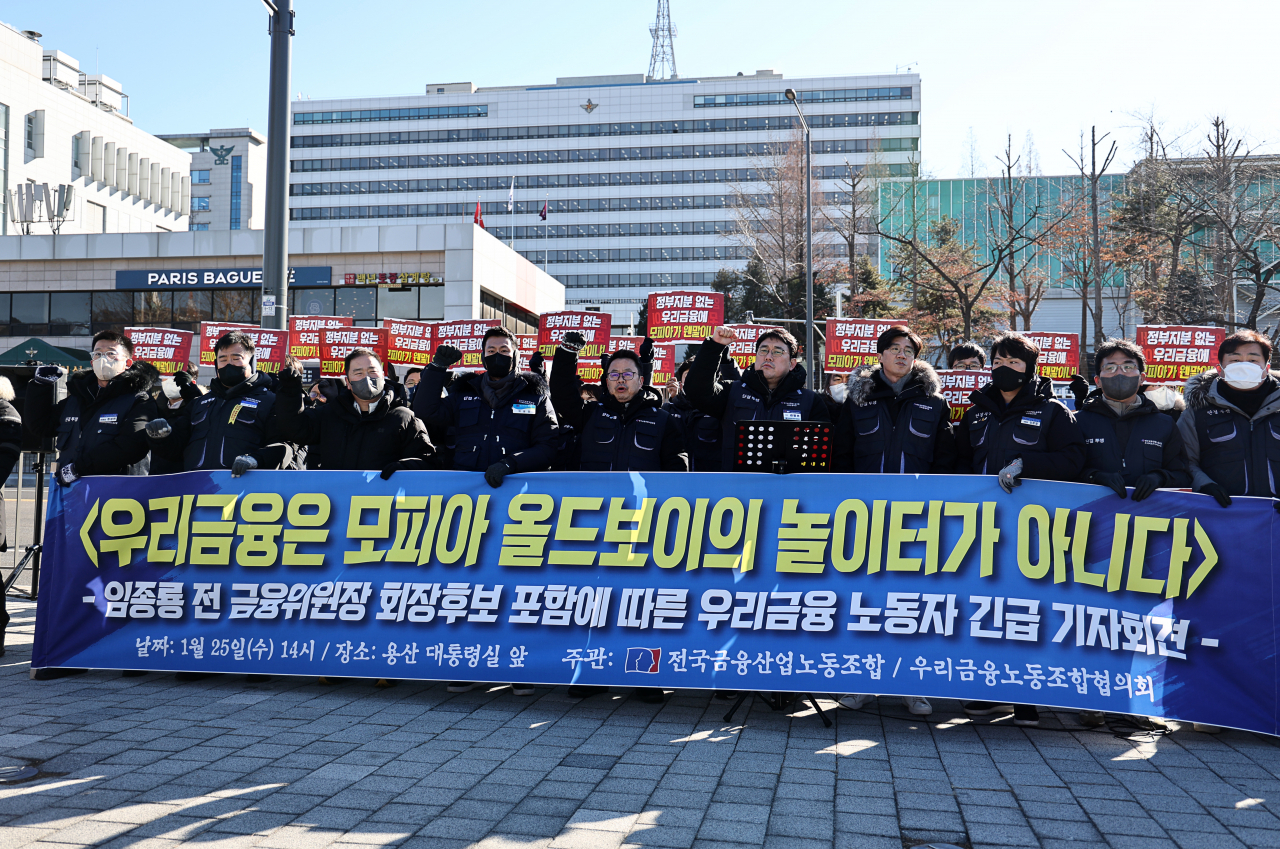 |
Woori Financial Group’s union holds a press conference on Wednesday to express their concerns about the firm's chairman candidate Lim Jong-ryong in front of the presidential office in Yongsan-gu, Seoul. (Yonhap) |
The bid by a former head of the country’s top financial regulator for the chairmanship of Woori Financial Group has stoked controversy and rekindled concerns of bureaucratic involvement in the highly regulated banking industry.
Lim Jong-ryong was chairman of the Financial Services Commission from 2015 to 2017 under the Park Geun-hye administration. He also served as chairman of NongHyup Financial Group from back in 2013 to 2015.
On Wednesday, Woori Financial Group’s union held a press conference to express their concerns about Lim's latest bid.
“We have deep concerns about Woori Financial Group becoming a playground of former bureaucrats,” the union said in a statement.
“After being appointed as the chairman of NongHyup Financial Group, he selected a high-ranking ex-bureaucrat that he is personally close with for an outside director position, which is responsible for monitoring CEO's arbitrariness and corruption,” the union said during the press conference.
Woori’s union also claimed that, before privatization of Woori Bank in 2021, it was difficult for the bank to develop due to bureaucrats' influence.
"Lim is the one who claimed that Woori Bank's biggest hurdle for growth is the government's involvement in management (when he was serving as the chairman of the Financial Services Commission)," the union said.
These kinds of concerns are nothing new as they reemerge whenever a financial group’s appointment season for a new chairman approaches.
There were similar scenes in December, when former state policy coordination chief Lee Seok-joon under the Park Geun-hye government was selected as the chairman and CEO of Nonghyup Financial Group, one of the country's major financial holding firms.
Experts say those in the financial industry are especially sensitive about the leadership issue because they are easily affected by different government policies.
On top of this, industry experts see that different administrations’ repeated past practices of showing will to put a stop to government officials taking influential posts in financial companies as it easily leads to corruption, and not living up to it, also worsened the industry’s negative view over the issue.
Despite existing concerns, chairman selection committees of local financial groups often consider former bureaucrats as candidates mainly because they can also be helpful when doing business.
“There are people within the financial groups that actually prefer a chairman with some connection with the government. It is seen as helpful when working with the government as they can communicate better,” Seo Ji-yong, a business professor at Sangmyung University, told The Korea Herald.
Back in the 1960s when the country pursued state-led economic growth, the government was involved in many financial decisions, including those on interest rates, loan distribution, budgets and recruitment.
Now those roles are played by private banks and other financial institutions, but the government still gives guidance on limits of loans and rates to protect consumers, and to ensure the stability of the financial system.
But even the positive influence that politically connected executives bring to companies remains questionable.
According to a study conducted by the state-run think tank Korea Development Institute on the economic effects of employing former bureaucrats at financial companies, there was no significant change in the risk management level of financial institutions after former officials from the Financial Services Commission, Financial Supervisory Service or the Finance Ministry took office.
The only notable exception was when top bureaucrats from the financial watchdog FSS took office, the probability of a financial company receiving penalties decreased significantly by 16.4 percent.
However, professor Seo said that this doesn't mean a government official should be immediately dismissed as unqualified based on these findings.
“Financial groups must carefully review whether (the former government official) has the capabilities to be their leader,” Seo added.







![[Today’s K-pop] Blackpink’s Jennie, Lisa invited to Coachella as solo acts](http://res.heraldm.com/phpwas/restmb_idxmake.php?idx=644&simg=/content/image/2024/11/21/20241121050099_0.jpg)